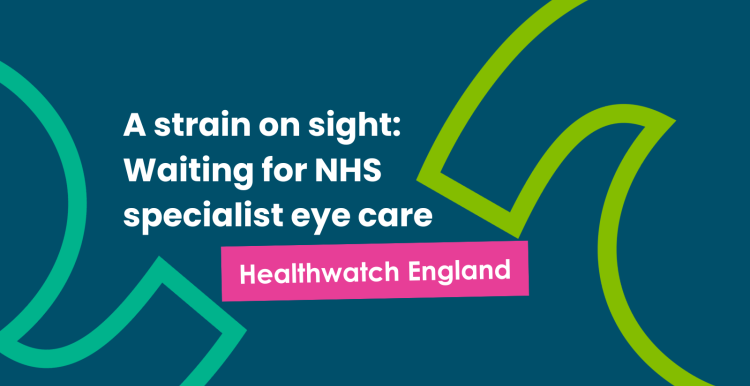A strain on sight: Waiting for NHS specialist eye care

Context
Eye care is the busiest outpatient speciality in the NHS in England, and with an ageing population, demand is set to grow further.
According to NHS statistics, of the nearly 59,000 people currently waiting for specialist eye care as of December 2024, only two-thirds (66.8%) have been waiting less than the 18-week target set by Government, compared to a target of 92%.
New research from Healthwatch reveals strong public support for greater use of staff in high street opticians, as people bear the brunt of long waiting times for specialist eye care.
We are calling for optician services, including optometrists, to have more responsibility for managing people’s eye care and referring them on for specialist treatment to help cut waiting times. Additionally, actions such as those proposed in the Optometry First model are needed to improve communications and support for people waiting for eye care.
Key Recommendations
The NHS should publish ophthalmology waiting list data by condition.
- The NHS currently publishes waiting list data for all ophthalmology treatments together.
- Condition-specific data would allow increased scrutiny of waiting time progress for the most serious conditions, and ensure appropriate allocation of resources.
The Government should make greater use of optometrists to help cut waiting times and provide more treatment and aftercare closer to home.
- Optometrists in the community are highly skilled and in every locality in England.
- Respondents to our survey supported making better use of their skills, which could improve patient experience.
Improved support and communication for patients while they wait.
- Eye Care Liaison Officers, (ECLOs) provide vital support to those diagnosed with a condition that affects their sight.
- In England, the current ECLO coverage in the top 150 ophthalmic centres is 71%.
- The NHS should ensure trusts and other commissioners and funders of eye care services support the increase and sustainability of the funding of this programme alongside RNIB, with universal access as the ultimate aim.
If you need this report in a different format, please email enquiries@healthwatch.co.uk or call 030000 68 3000.


